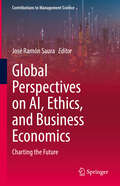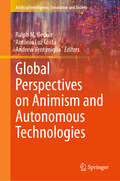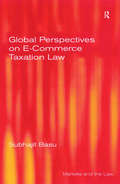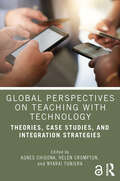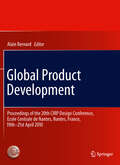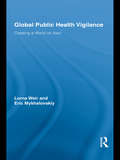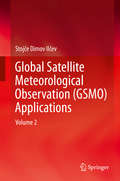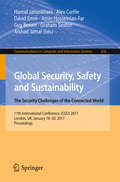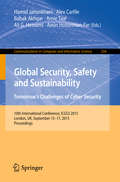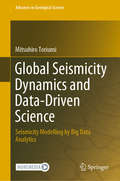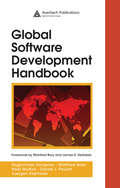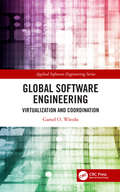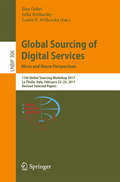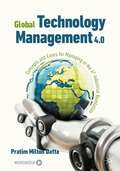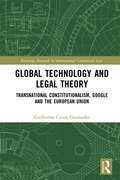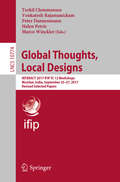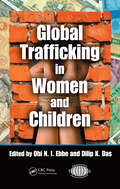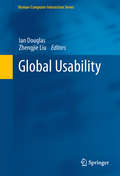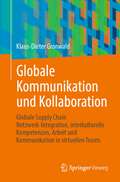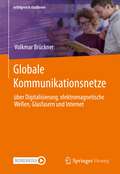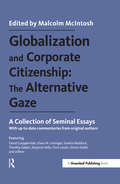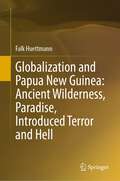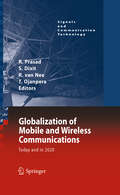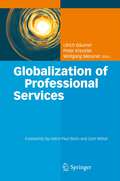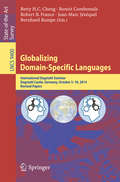- Table View
- List View
Global Perspectives on AI, Ethics, and Business Economics: Charting the Future (Contributions to Management Science)
by José Ramón SauraThis book offers an in-depth exploration of the complex and rapidly evolving world of artificial intelligence (AI), focusing on its ethical, economic, and business dimensions. It provides a comprehensive analysis that intertwines historical context, philosophical ethics, global economic impacts, regulatory landscapes, workforce dynamics, corporate governance, consumer behavior, data ethics, and the use of AI for the good of society. After reviewing the evolution of AI, it offers insights into its historical milestones and the trajectory it may take in the future. This sets the stage for a broader discussion on how AI is not just a technological phenomenon but also a catalyst for ethical, economic, and societal transformation. The book emphasizes the importance of understanding AI&’s historical development in order to gauge its potential impacts on our future. It examines various ethical theories, including utilitarianism, deontology, and virtue ethics, and their application in the realm of AI. Moreover, it explores how AI is reshaping industries, shifting market dynamics, and transforming the global economic landscape.
Global Perspectives on Animism and Autonomous Technologies (Artificial Intelligence, Simulation and Society)
by Andrew Ventimiglia Ralph M. Becker Antônio Luz CostaThis volume provides a timely analysis of the emerging phenomenon of autonomous technology, a topic of intense contemporary importance given the transformative potential and risks posed by rapidly developing AI systems. It utilizes a unique approach by focusing on the ways that these technologies can be understood via the lens of animism and ‘techno-animism,’ a term that denotes how society and individual users are attributing life-like properties – agency, intention, and will – to technological systems. The volume further interrogates and critiques the ways that autonomous technologies are often intentionally designed to promote socioemotional connections with users. The volume investigates such technologies through a variety of global settings and interdisciplinary lenses. With contributions from scholars across anthropology, sociology, communication studies, law, and design theory, it offers a range of perspectives on how autonomous technologies are reshaping cultural and social institutions worldwide. Furthermore, this collection addresses the urgent need for concrete research on the readiness of legal and social frameworks to incorporate autonomous technologies. With the imminent widespread integration of autonomous technologies into our everyday lives, the volume provides a critical examination of human-technology interaction and its immediate implications, guiding readers through the intricate web of digital interconnectedness that is on course to define the future of humanity.
Global Perspectives on E-Commerce Taxation Law (Markets And The Law Ser.)
by Subhajit BasuIn its most advanced form, e-commerce allows unidentified purchasers to pay obscure vendors in 'electronic cash' for products that are often goods, services and licenses all rolled into one. This book considers the implications for the domestic and international tax systems of the growth of e-commerce. It covers a wide variety of activities, from discussion of the principles governing direct and indirect taxation, to explanation of the implementation and use of e-commerce on the part of businesses as well as the application of existing tax principles in this field. With its focus on the broader issues surrounding the expansion of e-commerce and its attention to the problems arising internationally in this field, Global Perspectives in E-Commerce Taxation Law will appeal to scholars worldwide.
Global Perspectives on Teaching with Technology: Theories, Case Studies, and Integration Strategies
by Helen Crompton Agnes Chigona Nyarai TunjeraGlobal Perspectives on Teaching with Technology presents a wealth of current research on how teacher education and training programs around the world are preparing teachers to integrate and apply learning technologies across subjects, grade levels, and regions. Digital tools are more integral than ever to an accessible and well-rounded education, although their rapid evolution and proliferation necessitate new guidance into their effective integration and intended outcomes. This book provides graduate students, faculty, and researchers of teacher education, as well as trainers of in-service teachers with field-tested frameworks, evidence-based theories and models, and real-world examples of the complexities and affordances of teaching with technology. Internationally sourced to reflect today's richly diverse and globalized learner populations, the case studies collected here offer fresh approaches for teacher educators and a springboard for education researchers studying how practitioners can thrive in their classrooms and foster equity among students.Chapter 16 of this book is freely available as a downloadable Open Access PDF at http://www.taylorfrancis.com under a Creative Commons Attribution-Non Commercial-No Derivatives (CC-BY-NC-ND) 4.0 license.
Global Product Development: Proceedings of the 20th CIRP Design Conference, Ecole Centrale de Nantes, Nantes, France, 19th-21st April 2010
by Alain BernardThis book of proceedings is the synthesis of all the papers, including keynotes presented during the 20th CIRP Design conference. The book is structured with respect to several topics, in fact the main topics that serve at structuring the program. For each of them, high quality papers are provided. The main topic of the conference was Global Product Development. This includes technical, organizational, informational, theoretical, environmental, performance evaluation, knowledge management, and collaborative aspects. Special sessions were related to innovation, in particular extraction of knowledge from patents.
Global Public Health Vigilance: Creating a World on Alert (Routledge Studies in Science, Technology and Society)
by Lorna Weir Eric MykhalovskiyGlobal Public Health Vigilance is the first sociological book to investigate recent changes in how global public health authorities imagine and respond to international threats to human health. This book explores a remarkable period of conceptual innovation during which infectious disease, historically the focus of international disease control, was displaced by "international public health emergencies," a concept that brought new responsibilities to public health authorities, helping to shape a new project of global public health security. Drawing on research conducted at the World Health Organization, this book analyzes the formation of a new social apparatus, global public health vigilance, for detecting, responding to and containing international public health emergencies. Between 1995 and 2005 a new form of global health surveillance was invented, international communicable disease control was securitized, and international health law was fundamentally revised. This timely volume raises critical questions about the institutional effects of the concept of emerging infectious diseases, the role of the news media in global health surveillance, the impact of changes in international health law on public health reasoning and practice, and the reconstitution of the World Health Organization as a power beyond national sovereignty and global governance. It initiates a new research agenda for social science research on public health.
Global Satellite Meteorological Observation (GSMO) Applications: Volume 2
by Stojče Dimov IlčevThis book presents principal structures of space systems functionality of meteorological networks, media and applications for modern remote sensing, transmission systems, meteorological ground and users segments and transferring weather data from satellite to the ground infrastructures and users. The author presents techniques and different modes of satellite image interpretation, type of satellite imagery, spectral imaging properties, and enhancement of imaging technique, geo-location and calibration, atmospheric and surface phenomena. Several satellite meteorological applications are introduced including common satellite remote sensing applications, weather analysis, warnings and prediction, observation and measurements of meteorological variables, atmosphere and surface applications, ocean and coastal applications, land, agriculture and forestry applications, and maritime and aviation satellite weather applications. The author also covers ground segment and user segment in detail. The final chapter looks to the future, covering possible space integrations in meteorological and weather observation.This is a companion book of Global Satellite Meteorological Observation Theory (Springer), which provides the following topics:Evolution of meteorological observations and history satellite meteorologySpace segment with satellite orbits and meteorological payloadsAnalog and digital transmission, type of modulations and broadcasting systemsAtmospheric radiation, satellite meteorological parameters and instrumentsMeteorological antenna systems and propagation
Global Security, Safety and Sustainability - The Security Challenges of the Connected World
by Hamid Jahankhani Alex Carlile Amin Hosseinian-Far David Emm Guy Brown Graham Sexton Arshad JamalThis book constitutes the refereed proceedings of the 11th International Conference on Global Security, Safety and Sustainability, ICGS3 2017, held in London, UK, in January, 2017. The 32 revised full papers presented were carefully reviewed and selected from 74 submissions. The papers are organized in topical sections on the future of digital forensics; cyber intelligence and operation; information systems security management; systems security, safety, and sustainability; cyber infrastructure protection.
Global Security, Safety and Sustainability: Tomorrow's Challenges of Cyber Security
by Babak Akhgar Hamid Jahankhani Alex Carlile Amie Taal Ali G. Hessami Amin Hosseinian-FarThis book constitutes the refereed proceedings of the 10th International Conference on Global Security, Safety and Sustainability, ICGS3 2015, held in London, UK, in September 2015. The 31 revised full papers presented were carefully reviewed and selected from 57 submissions. The papers focus on the challenges of complexity, rapid pace of change and risk/opportunity issues associated with the 21st century living style, systems and infrastructures.
Global Seismicity Dynamics and Data-Driven Science: Seismicity Modelling by Big Data Analytics (Advances in Geological Science)
by Mitsuhiro ToriumiThe recent explosion of global and regional seismicity data in the world requires new methods of investigation of microseismicity and development of their modelling to understand the nature of whole earth mechanics. In this book, the author proposes a powerful tool to reveal the characteristic features of global and regional microseismicity big data accumulated in the databases of the world. The method proposed in this monograph is based on (1) transformation of stored big data to seismicity density data archives, (2) linear transformation of microseismicity density data matrixes to correlated seismicity matrixes by means of the singular value decomposition method, (3) time series analyses of globally and regionally correlated seismicity rates, and (4) the minimal non-linear equations approximation of their correlated seismicity rate dynamics. Minimal non-linear modelling is the manifestation for strongly correlated seismicity time series controlled by Langevin-type stochastic dynamic equations involving deterministic terms and random Gaussian noises. A deterministic term is composed minimally with correlated seismicity rate vectors of a linear term and of a term with a third exponent. Thus, the dynamics of correlated seismicity in the world contains linearly changing stable nodes and rapid transitions between them with transient states. This book contains discussions of future possibilities of stochastic extrapolations of global and regional seismicity in order to reduce earthquake disasters worldwide. The dataset files are available online and can be downloaded at springer.com.
Global Software Development Handbook
by Raghvinder Sangwan Matthew Bass Neel Mullick Daniel J. Paulish Juergen KazmeierEconomics and technology have dramatically re-shaped the landscape of software development. It is no longer uncommon to find a software development team dispersed across countries or continents. Geographically distributed development challenges the ability to clearly communicate, enforce standards, ensure quality levels, and coordinate tasks. Globa
Global Software Engineering: Virtualization and Coordination (Applied Software Engineering Series)
by Gamel O. WireduTechnology and organizations co-evolve, as is illustrated by the growth of information and communication technology (ICT) and global software engineering (GSE). Technology has enabled the development of innovations in GSE. The literature on GSE has emphasized the role of the organization at the expense of technology. This book explores the role of technology in the evolution of globally distributed software engineering. <P><P>To date, the role of the organization has been examined in coordinating GSE activities because of the prevalence of the logic of rationality (i.e., the efficiency ethos, mechanical methods, and mathematical analysis) and indeterminacy (i.e., the effectiveness ethos, natural methods, and functional analysis). This logic neglects the coordination role of ICT. However, GSE itself is an organizational mode that is technology-begotten, technology-dominated, and technology-driven, as is its coordination. GSE is a direct reflection of ICT innovation, change, and use, yet research into the role technology of GSE has been neglected. <P><P>Global Software Engineering: Virtualization and Coordination considers existing fragmented explanations and perspectives in GSE research, poses new questions about GSE, and proposes a framework based on the logic of virtuality (i.e., creativity ethos, electrical methods, and technological analysis) rather than of rationality and indeterminacy. Virtuality is the primary perspective in this book’s comprehensive study of GSE. The book concludes with an integrated explanation of GSE coordination made possible through ICT connectivity and capitalization.
Global Sourcing of Digital Services: 11th Global Sourcing Workshop 2017, La Thuile, Italy, February 22-25, 2017, Revised Selected Papers (Lecture Notes in Business Information Processing #306)
by Ilan Oshri, Julia Kotlarsky and Leslie P. WillcocksThis book constitutes revised selected papers from the 11th international Global Sourcing Workshop 2017, held in La Thuile, Italy, in February 2017. The 10 contributions included were carefully reviewed and selected from 45 submissions. The book offers a review of the key topics in sourcing of services, populated with practical frameworks that serve as a tool kit to students and managers. The range of topics covered in this book is wide and diverse, offering micro and macro perspectives on successful sourcing of services. Case studies from various organizations, industries and countries are used extensively throughout the book, giving it a unique position within the current literature offering.
Global Technology Management 4.0: Concepts and Cases for Managing in the 4th Industrial Revolution
by Pratim Milton DattaTechnology is pervasive in today’s globalized world. Moreover, technology and globalization drive competitiveness and strategy, and must be managed well. This textbook uses technology management as the central theme to cover multiple business and social facets, including digital transformation, cybersecurity, international operations, marketing, finance, culture, human capital, and the political economy. The book is divided into four sections. Part 1 examines the confluence of globalization and technology from the first Industrial Revolution to the current Fourth Industrial Revolution. Part 2 introduces strategic and analytical metrics and models that are crucial to managerial decision-making. Part 3 discusses the basics of cybersecurity and combating cyber-threats to protect organization and its stakeholders. Part 4 focuses on sustainable operations, global projects, and digital transformation in a technology-centric, globalized world. The book will help students learn how to navigate business aspects of globalization and technology in the 4th Industrial Revolution (4IR). For instructors, the learning objectives and discussion questions help guide students in grasping the material.
Global Technology and Legal Theory: Transnational Constitutionalism, Google and the European Union (Routledge Research in International Commercial Law)
by Guilherme Cintra GuimarãesThe rise and spread of the Internet has accelerated the global flows of money, technology and information that are increasingly perceived as a challenge to the traditional regulatory powers of nation states and the effectiveness of their constitutions. The acceleration of these flows poses new legal and political problems to their regulation and control, as shown by recent conflicts between Google and the European Union (EU). <P><P> This book investigates the transnational constitutional dimension of recent conflicts between Google and the EU in the areas of competition, taxation and human rights. More than a simple case study, it explores how the new conflicts originating from the worldwide expansion of the Internet economy are being dealt with by the institutional mechanisms available at the European level. The analysis of these conflicts exposes the tensions and contradictions between, on the one hand, legal and political systems that are limited by territory, and, on the other hand, the inherently global functioning of the Internet. The EU’s promising initiatives to extend the protection of privacy in cyberspace set the stage for a broader dialogue on constitutional problems related to the enforcement of fundamental rights and the legitimate exercise of power that are common to different legal orders of world society. Nevertheless, the different ways of dealing with the competition and fiscal aspects of the conflicts with Google also indicate the same limits that are generally attributed to the very project of European integration, showing that the constitutionalization of the economy tends to outpace the constitutionalization of politics. <P><P> Providing a detailed account of the unfolding of these conflicts, and their wider consequences to the future of the Internet, this book will appeal to scholars working in EU law, international law and constitutional law, as well as those in the fields of political science and sociology.
Global Thoughts, Local Designs: Ifip Tc 13 Workshops At Interact 2017, Mumbai, India, September 25-27, 2017, Revised Selected Paperrs (Theoretical Computer Science and General Issues #10774)
by Torkil Clemmensen Marco Winckler Venkatesh Rajamanickam Peter Dannenmann Helen PetrieThis book contains revised selected papers presented at 4 workshops held at the 16th IFIP TC 13 International Conference on Human-Computer Interaction, INTERACT 2017, in Mumbai, India, in September 2017. The workshops are: Workshop on Dealing with Conflicting User Interface Properties in User-Centered Development Processes (IFIP WG 13.2 and 13.5), Workshop on Cross Cultural Differences in Designing for Accessibility and Universal Design Organizers (IFIP WG 13.3), Human Work Interaction Design Meets International Development (IFIP WG 13.6), and Beyond Computers: Wearables, Humans, and Things - WHAT! (IFIP WG 13.7).The 15 full papers included in this volume were carefully reviewed and selected from numerous submissions. They show advances in the field of HCI dealing with topics such as human-centered computing, user interface design, evolutionary user interface prototyping, end-user development systems, accessibility design, human work interaction design, and wearables.
Global Trafficking in Women and Children (International Police Executive Symposium Co-Publications)
by Dilip K. Das Obi N. I. EbbeWar, poverty, and famine; political, social, and economic change; and the deep seated views and rituals rooted in a culture‘s history and traditions all contribute to the widespread and growing trafficking of women and children. The multilayered complexity, myriad contributing factors, enormous amount of money involved, and sheer magnitude of the
Global Usability
by Ian Douglas Zhengjie LiuThe concept of usability has become an increasingly important consideration in the design of all kinds of technology. As more products are aimed at global markets and developed through internationally distributed teams, usability design needs to be addressed in global terms. Interest in usability as a design issue and specialist area of research and education has developed steadily in North America and Europe since the 1980's. However, it is only over the last ten years that it has emerged as a global concern. Global Usability provides an introduction to the important issues in globalizing design and an insight into the development of usability expertise around the world. The book is divided into two sections. The first section deals with the general issues in cross-cultural design and the methods for conducting usability design and evaluation across geographical boundaries. The second section describes the state of usability development in fifteen countries. The descriptions include a history and review of activities and include some unique perspectives that have developed in relation to usability work. Researchers and practitioners from a variety of design-related disciplines will find the book a useful guide for understanding the issues and an excellent reference source for working in any of the countries covered.
Globale Kommunikation und Kollaboration: Globale Supply Chain Netzwerk-Integration, interkulturelle Kompetenzen, Arbeit und Kommunikation in virtuellen Teams
by Klaus-Dieter GronwaldDie technologiegetriebene Digitalisierung globaler Supply Chain-Netzwerke hat viele Facetten. Sie steht im Spannungsfeld politischer, ökonomischer, ökologischer und gesellschaftlicher Faktoren. Der Erwerb notwendiger Kernkompetenzen in den Bereichen Big Data, In-Memory Computing, Machine Learning und Data Management ist zwingend. Blockchains, Smart Contracts und Due Diligence für Supply Chain Management-Systeme beeinflussen den Wandel von einer Shareholder-dominierten Unternehmensführung zu einer Stakeholder-fokussierten globalen Unternehmensverantwortung mit ethischen Werten. Das Verständnis kultureller Unterschiede in Arbeitsstilen ist ein Schlüssel zu einer erfolgreichen globalen Teamarbeit. Die wichtigsten Theorien zur Internationalisierung von Unternehmen und zu kulturellen Dimensionen/Distanzen werden diskutiert, um interkulturelle Kompetenzen und Konfliktmanagementstile für internationale Projektmanager zu entwickeln.Leserinnen und Leser lernen die Herausforderungen internationaler Kooperation kennen und können die für die Bedürfnisse globaler virtueller Teams relevanten Formen der Zusammenarbeit unter Einsatz von Technologien und Medien anwenden.
Globale Kommunikationsnetze: über Digitalisierung, elektromagnetische Wellen, Glasfasern und Internet (erfolgreich studieren)
by Volkmar BrücknerAufbauend auf gymnasialen Kenntnissen werden die Zusammenhänge zwischen Glasfaser-Festnetz als Grundlage für schnelle Datenübertragung und mobilen Geräten wie Smartphones als Zugang zu Informationen immer und von überall geschildert. Dabei werden vorrangig Methoden der digitalen Informationsübertragung behandelt. Besonderer Wert wird anhand von Beispielen auf die Entwicklung von Fähigkeiten gelegt, technische Probleme in eine „Ingenieurssprache“ zu übertragen. Zudem werden Probleme der Datensicherheit und deren mögliche Lösungen in der Zukunft an Beispielen erläutert.
Globalization and Corporate Citizenship: A Collection of Seminal Essays
by Malcolm McIntoshThe theory and practice of corporate citizenship and CSR have many alternative perspectives to the business-as-usual gaze. The essays in this volume encapsulate the essence of these alternative ideas and embrace the idea that progressive ways and means of this century do not lie in mainstream capitalist thinking. These pieces ask critical questions about the way we see the relationship between capitalism, business models and society – a subject not often discussed in non-academic literature. Globalization and Corporate Citizenship: The Alternative Gaze features contributions and new analysis from Klaus M. Leisinger, Chris Laszlo, David Coopperrider, Simon Zadek, Sandra Waddock and others. This title is one of a two-volume set – a collection of seminal and thought-provoking essays, drawn from the Journal of Corporate Citizenship’s archive, accompanied by new analysis and reflection from the original authors. Written by some of the most widely recognized academic and business pioneers and leaders of the corporate responsibility and global sustainability movement, the volumes make essential reference texts for anyone interested in the radically awakening new global political economy.
Globalization and Papua New Guinea: Ancient Wilderness, Paradise, Introduced Terror and Hell
by Falk HuettmannThis book aims to present a reality view for Papua New Guinea based on many years of first-hand field work and research accounts. It further assesses sustainability in the light of 47,000 years of a self-sustained type of civilization without bad global impacts. This book contrasts the modern sustainable development failures from the colonial times onwards, as promoted by the ‘western world’, namely Australia, the UK, EU and the U.S as well as Japan and now, China, in times of globalization, Trump’ism and royal governance (Papua New Guinea is still part of the British Dominion and of the Antarctic Treaty etc). This assessment and book is the first of its kind also employing modern data analysis, Landscape Ecology principles (patterns and processes, telecoupling) and Geographic Information Systems (GIS) with Open Access data focusing on ecological economics, marxism, socialism and contrasting it with current capitalism and neoliberalism that Papua New Guinea is fully exposed to. Throughout the 31 book chapters various aspects are covered how a further insistence on the ‘new’ Sustainable Development Goals (SDGs) and so-called Development Aid will result in unwanted side effects and perverse outcomes for Papua New Guinea and for the world in times of wider ‘global change’ and unprecedented man-made crisis.
Globalization of Mobile and Wireless Communications
by Sudhir Dixit Ramjee Prasad Tero Ojanpera Richard Van NeeGlobalization of Mobile and Wireless Communications is a collection of cutting-edge research in mobile and wireless communications with impact on developments as far forward as 2020 and beyond. The book draws upon the insights and performed research work of leading experts in the field. Topics of discussion are related but not limited to spectrum-efficient radio interface technologies, enabling technologies for reconfigurability, wireless sensor networks, cognitive networks, coherent wireless transmission, algorithmic design, middleware for novel services and applications. The material has been edited to provide a vision for the future of mobile and wireless, towards a dynamic communication system that breaks down the barriers between communications means; and evolves and integrates business models and culture to match the technological evolution. In addition, strategies on how to overcome the technological challenges for achieving that vision are also outlined.
Globalization of Professional Services: Innovative Strategies, Successful Processes, Inspired Talent Management, and First-Hand Experiences
by Ulrich Bäumer Peter Kreutter Wolfgang MessnerIn the past, services had a strong local and national focus. Professional services were very likely to be independently and autonomously organized from country to country in order to cater to local needs and local legal requirements. This has since changed radically, and highly integrated business and delivery models around the globe have become the status quo in clients' businesses and strategies. Serving clients on a global level requires professional services firms to adopt a structural change from local to distributed global sales and delivery. This book brings together many years of experience, current perspectives and future ideas of international business practitioners, academics, and market researchers. Along those lines it is structured into four parts. Part I "Winning Strategies and Innovative Ideas" lays the book's foundation: it discusses core strategies behind the globalization movement and introduces the major paradigms and ideas. Part II "Successful Processes for Realization" provides solutions for how to establish successful processes for delivering global professional services. Part III "Inspired Talent Management" goes to the core of the professional services industry: attracting, developing, and keeping the right talent in the right locations. Finally, Part IV offers "Experiences and Case Studies" on all aspects related to successfully building a globalized professional services firm. In short, this handbook provides professional services firms and their clients alike with a sound foundation for responding strategically to fundamental global changes and turning them into business advantages. It offers a comprehensive perspective of why and how to successfully globalize a professional services firm.
Globalizing Domain-Specific Languages
by Betty H. C. Cheng Benoit Combemale Robert B. France Jean-Marc Jézéquel Bernhard RumpeThe development of modern complex software-intensive systems often involves the use of multiple DSMLs that capture different system aspects. Supporting coordinated use of DSMLs leads to what we call the globalization of modeling languages, that is, the use of multiple modeling languages to support coordinated development of diverse aspects of a system. In this book, a number of articles describe the vision and the way globalized DSMLs currently assist integrated DSML support teams working on systems that span many domains and concerns to determine how their work on a particular aspect influences work on other aspects. Globalized DSMLs offer support for communicating relevant information, and for coordinating development activities and associated technologies within and across teams, in addition to providing support for imposing control over development artifacts produced by multiple teams. DSMLs can be used to support socio-technical coordination by providing the means for stakeholders to bridge the gap between how they perceive a problem and its solution, and the programming technologies used to implement a solution. They also support coordination of work across multiple teams. DSMLs developed in an independent manner to meet the specific needs of domain experts have an associated framework that regulates interactions needed to support collaboration and work coordination across different system domains. The articles in the book describe how multiple heterogeneous modeling languages (or DSMLs) can be related to determine how different aspects of a system influence each other. The book includes a research roadmap that broadens the current DSML research focus beyond the development of independent DSMLs to one that provides support for globalized DSMLs.
